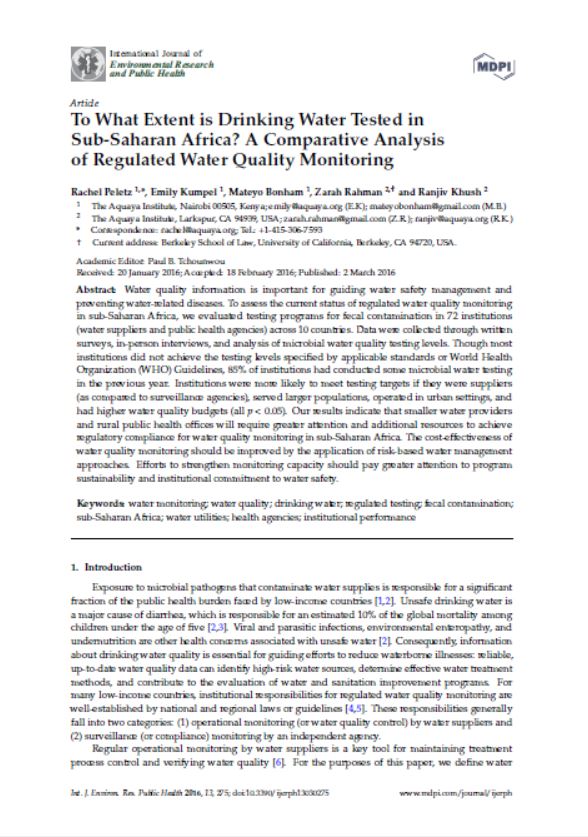To What Extent is Drinking Water Tested in Sub-Saharan Africa? A Comparative Analysis of Regulated Water Quality Monitoring
 |
article coll. International Journal of Environmental Research and Public Health n° 13 Mar 2016 ; 14 pages
Aut.
Ed. IJERPH - Basel
Téléchargeable sous format: PdF
Téléchargeable chez l'éditeur
Site internet: https://www.mdpi.com/1660-4601/13/3/275
Abstract:
Water quality information is important for guiding water safety management and preventing water-related diseases. To assess the current status of regulated water quality monitoring in sub-Saharan Africa, we evaluated testing programs for fecal contamination in 72 institutions (water suppliers and public health agencies) across 10 countries. Data were collected through written surveys, in-person interviews, and analysis of microbial water quality testing levels. Though most institutions did not achieve the testing levels specified by applicable standards or World Health Organization (WHO) Guidelines, 85% of institutions had conducted some microbial water testing in the previous year. Institutions were more likely to meet testing targets if they were suppliers (as compared to surveillance agencies), served larger populations, operated in urban settings, and had higher water quality budgets (all p < 0.05). Our results indicate that smaller water providers and rural public health offices will require greater attention and additional resources to achieve regulatory compliance for water quality monitoring in sub-Saharan Africa. The cost-effectiveness of water quality monitoring should be improved by the application of risk-based water management approaches. Efforts to strengthen monitoring capacity should pay greater attention to program sustainability and institutional commitment to water safety.
Mots clefs: |
eau potable (CI) (DT) (OP) (ope) , opérateur (CI) (DT) (OP) (ope) , qualité des eaux (CI) (DT) (OP) (ope) |
Editeur/Diffuseur: |
|
IJERPH
-
International Journal of Environmental Research and Public Health - Basel - Suisse |
En cas de lien brisé, nous le mentionner à communication@pseau.org